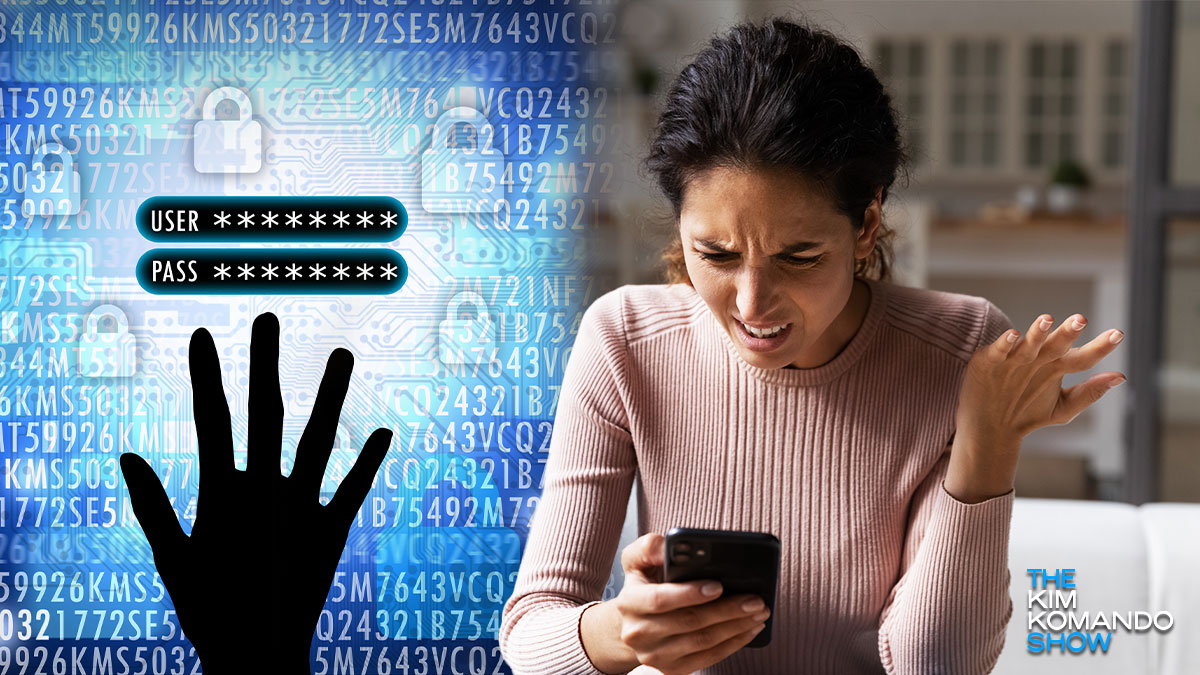✈️ Get back in line: American Airlines is considering new boarding tech that sounds a really loud beep when you try to cut the line and board without your group. It’s being tested now in Albuquerque, Tucson and Washington, D.C. I’ll spare you a plane joke (it won’t take off), but if you need a laugh, watch George Carlin talk about the boarding process. So funny.
Bank fraud is rising – How to protect yourself

The scams don’t stop — and here’s another one you need to know about. Your phone rings. It’s a rep from your bank, and they’re warning your account has been compromised. You’re smart, so you immediately suspect it’s a scam.
Then, the guy on the other end reads off your Social Security number and account info. Only your bank could know that, right?
Some 300,000 people in the U.S. thought the same last year. People lost their life savings; one Virginia woman had a whopping $700,000 wired out of her Wells Fargo account, and another in Los Angeles lost $100,000 in minutes.
📈 Why banking scams are rising
Bank scams used to be a niche operation. Now, anyone can buy the tools to con you for a few bucks on the Dark Web. There are even guides to make a phone number look like it’s from your bank, including phony customer service reps to answer all your questions.
Pro scammers rely on social engineering, too. That’s the fancy name for mind games to gain your trust. They love jumping on video calls because seeing a face makes you more trusting. They’ll keep chatting with you so you miss the security alerts warning you to stop.
The big banks lost interest
Last year, the banks reimbursed scam victims at pitiful rates. JPMorgan Chase reimbursed 2% of transactions disputed as scams, while Wells Fargo reimbursed 4% of scam claims. Bank of America, meanwhile, reimbursed 24% of its scam dispute transactions.
Federal law requires banks to reimburse you only under certain circumstances, like if someone steals your phone and accesses your account. But if you’re the one to sign a wire form or agree to an online transfer and you find out it’s a scam, you’re screwed.
💰 Keep your money safe
- Slow down: If a caller claims to be from your bank or asks for your account details, hang up. Call the bank yourself. Do not Google your bank’s number; find it on their official website or the back of your card.
- Beware of transfer scams: Never send money via wire transfer, crypto or gift cards in response to unsolicited calls or emails. Your bank or the government will never ask you to transfer funds to a “safe” account.
- Don’t follow links: If you’re told to visit a website, download an app or click a link, it’s a phishing site or malware installation.
- Use a virtual phone number: I bet your real one has been leaked in a couple of data breaches this year. Use a virtual number tied to your finances scammers don’t know.
- Set up alerts: In your banking app, you can turn on alerts for transactions over a certain amount or made in a foreign country, as well as notifications about suspicious activity like attempted logins from a new browser. I have all this set up. Some banks let you set transaction limits on withdrawals or purchases, too.
🫡 This is serious stuff. I don’t want to be a Debbie Downer, but if I can save one person from losing their life savings, I’m doing my job. Share this important intel using the icons below with someone you know who needs this warning. You can make a difference.
Clever election scams targeting you

Fake political calls, texts and videos are nothing new. They’ve been flooding Americans’ phones for months. Some have a simple goal: Steal your money. (I’ll pass along a few tips for spotting those below.) Others are looking for detailed personal info, like a text scam warning there’s a problem with your ballot.
George Carlin on airlines and flying
Attn., Windows Insiders: Microsoft’s Recall feature is a privacy nightmare. Even after a backlash forced changes, Recall still captures info like credit cards and Social Security numbers. That’s with the “sensitive info filter” on. Microsoft says they’re fixing it. Again.
293% increase
In email attacks, compared to last year. Email scams exploded in the first half of 2024, including increases in ransomware, malware and phishing attempts. AI might not be helping tech companies turn a profit yet, but it’s sure helping cyber crooks.
Everything we know about the MoneyGram breach

Another day, another massive data breach. This time, it’s MoneyGram, a global mega-company that handles money transfers, bill pay and other financial services. They have digital platforms and retail locations, and they even power Walmart’s money-transfer service.
I wasted 36 hours trying to do it myself

So many of the calls, emails, messages and DMs I get are about privacy and security. I can’t remember the last time I had a full day where no one asked me some version of “How do I get all this info about me off the internet?”
Microsoft’s very bad advice: Some 240 million active PCs are too old to update to Windows 11. After years of telling us otherwise, Microsoft now says you can go ahead and update your incompatible PC. The big disclaimer: Your computer might not get every security patch and update, so it’s not worth the risk.
🍩 Krispy Kreme’s security hole: The doughnut giant’s fessing up about a Nov. 29 security breach that took down its online ordering system in parts of the U.S. Along with your credit card details, it’s a safe bet your deep, dark secrets (like how many times you bought a doughnut on the way to work) were leaked, too. Sing it with me: “Doughnut go breaking my heart. I couldn’t if I fried.” Yeah, that was bad.
🇨🇳 Remember when Verizon went down a few weeks ago? Chinese hackers were targeting phones used by Republican presidential candidate Donald Trump and his running mate JD Vance, the New York Times reported. Verizon says they’re working with law enforcement. I’m sure the Harris campaign is being targeted, too. You couldn’t pay me enough to run for office.
💳 PayPal update: Starting Nov. 27, PayPal will share your purchasing data with third-party merchants — think products, preferences, sizes and styles. Yes, you can stop it. In the app, tap your profile photo at the top right, followed by Data and privacy. Under Manage shared info, tap Personalized shopping, and toggle off the switch. On desktop, click the settings gear icon in the top right, then select Data & Privacy > Personalized shopping to toggle off the slider. It never stops …
Massive data leak impacts 1 in 3 Americans

Data broker MC2 Data left more than 100 million records of Americans exposed online for anyone to copy, grab, forward, sell on the Dark Web — you name it. This comes only a month after the National Public Data breach of 2.9 billion records. I’m getting so tired of these data broker companies and people-search sites screwing up, and it’s you and me who have to pay for their mistakes.
So much data left exposed for anyone to see

Another day, another monumental data breach. Just because they’re getting more common doesn’t mean you can tune it out. In fact, it’s time to get even more serious about your private information and what’s posted online.
Apalachee High School shooting: A teacher says a newly installed tech system called Centegix prevented even more casualties on Sept. 4. Staff carry digital cards that instantly alert law enforcement to a physical threat on campus. Officers arrived at the school within two minutes of the first shots going off. We need this to roll out nationwide now.
Heads-up, Gmail user: Starting Sept. 30, you won’t be able to use your Google Workspace account to log into third-party apps or devices that require only a username and password to sign up. If you see errors like “Invalid username,” “Invalid password” or “Unable to log in,” create a new account with the site instead of trying to log in with Google.
Elder fraud is on the rise – These are the most common scams

Here’s a stat that blows me away: One in every 10 seniors is a victim of identity theft each year. Americans over the age of 60 lost $3.4 billion in fraud schemes in 2023. That’s almost an 11% increase from the year before, and things are only getting worse.
When you don’t excel, people spreadsheet: On Tuesday, July 30, Outlook was stalling, the Starbucks app crashed and Office 365 was down for eight hours. We now know a cyberattack took down the cloud computing system Microsoft Azure and a ton of apps and services with it. D’oh! Microsoft’s attempts to stop the attacks actually made the outages worse.
Byte-Ban: Starting Aug. 15, U.S. House of Representatives staffers are banned from using all ByteDance apps on government devices. TikTok’s already out, but now the ban includes photo-editing apps CapCut and Hypic, chat app Lark and social media app Lemon8. It all comes down to TikTok’s ties to Communist China. I’m surprised it took them this long.
Update to iOS 17.6 ASAP: It packs 35 security fixes, tackling vulnerabilities that could let hackers control your phone. Don’t wait for it to pop up. On iPhone XS or later, go to Settings > General > Software Update now. Update your iPad, too, if you have one.